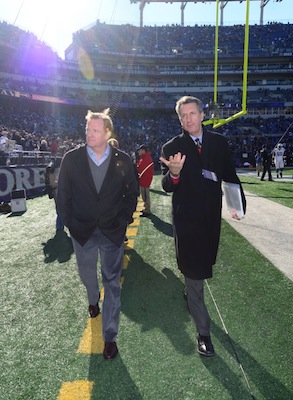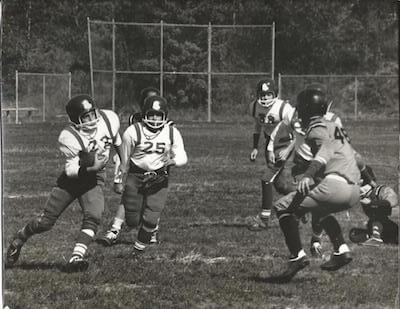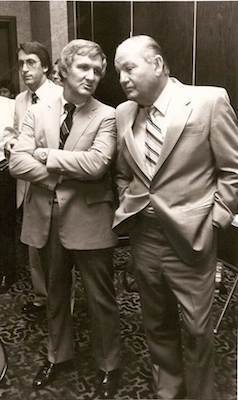A Football Life

Greg Aiello ’74 left Notre Dame determined to forge a long career as a journalist. After a brief stint as a sports writer, his plans changed. Aiello joined the Dallas Cowboys in 1979 as a public relations official and later moved on to the NFL’s league office in 1990. He spent the bulk of his career with the league as its primary spokesman. Over the last year, he transitioned to his current role as senior vice president of internal communications, and he remains a top advisor to the NFL Commissioner Roger Goodell.
Aiello spoke with Echoes during the week leading up to this year’s Super Bowl. In this edited transcript of that conversation, he looks back on his time at Notre Dame, what motivated his early career change, and a life spent around the game of football.
What number Super Bowl is this for you?
Well, I carefully counted them up, and it’s number 35—that’s actually attended. I’ve seen them all. I remember watching the first one when I was a kid at home. But I attended two as a reporter for UPI in the 70s, and ironically the Cowboys were in both of them. Then when I was with the Cowboys in the 80s, I went to six Super Bowls in various capacities for various reasons. And then I came up to the league office in 1990, and this will be my 27th.
Is it still special for you? Being at a game of that magnitude?
Oh yeah. It’s such a great day when the whole nation comes together, and the production is so spectacular now. It’s really special to be part of it and feel all that energy. The pregame leading up to kickoff just gives you chills—with the anthem and flyover and everything that takes place. It’s really spectacular.
I imagine you were a football fan when you were growing up on Long Island. Were you a Giants or Jets fan?
I started as a Giants fan, and this was in the early 60s when they were still good. And then the Giants went downhill, and the Jets were the new team in town. They were Long Island’s team. They had Joe Namath, and they went to the Super Bowl and won it when I was a junior in high school, so I became a Jets fan. In fact, I went to the first Jets game in Shea Stadium in 1964 with my father.
I've been a football nut since I was a kid, which also included watching the famous Notre Dame highlights with Lindsey Nelson on Saturday night if the game wasn’t on television. There weren’t too many on television at that time, but we got those Notre Dame highlights in an hour—“Moving ahead to further action”—and that was part of how I started to become interested in Notre Dame.
Did you play football when you were young?
Yes, but on no level that was significant. [I played] youth football, and I played in junior high school, but it turns out I wasn’t quite fast enough. My running speed was significantly lacking, so then it was just a matter of playing in the park and in the street and at Notre Dame playing a lot of touch football.

You mentioned that watching Notre Dame highlights as a kid was one of the first things that got you interested in the University. How did you end up deciding to attend Notre Dame?
There was a friend of the family who went to Notre Dame who was a little bit older than me, and he really liked it, so that helped spark my interest. I was interested in journalism, and there was a Communication Arts major. And I’ve always been attracted to big brand names, and Notre Dame has always had a good one. So I applied, got in, and decided to go. Most of my friends, we say this, we would never get in today.
In my freshman year, they eliminated the Communication Arts department and switched it to American Studies, with the idea that you could get experience in the campus media. You should major in an academic discipline and get your experience with the student media through the Observer, through Scholastic, through WNDU.
What practical experience did you get in journalism at Notre Dame?
I did some writing for the Observer—ironically not sports, more on the news side. I did some pieces for Scholastic. One on the Bengal Bouts. One with Father Cavanaugh on the 10th anniversary of the Kennedy assassination because he had spent the weekend after the president was assassinated with the Kennedy family. He was close to the Kennedy family. So I did things like that and continued on the path towards journalism.
When you reminisce about your time at Notre Dame, what do you find yourself thinking about most frequently?
My friends, the great times, the academics, which were always very stimulating. The well-rounded experience of attending Notre Dame was something that was very valuable that I really treasure, including the great sports environment. In football, it was [Joe] Theismann and [Thom] Gatewood and upsetting Texas in the Cotton Bowl my freshman year to winning the national championship my senior year with Tom Clements and Dave Casper and that group. Then basketball my freshman year was Austin Carr upsetting UCLA, then UCLA won 88 straight games until our senior year, when we beat them again in a famous game, upsetting Bill Walton, breaking the 88-game winning streak.
So there was a lot of great sports, and I was on the baseball team my freshman year. I was a soft tossing left-handed pitcher, and tried out in the fall of my freshman year and made the team. I think they just wanted to have a left-handed pitcher on the staff. So I was on the team my freshman year and then I didn’t really see my future being in baseball, so I gave it up in my sophomore year.
So you were selling yourself short earlier when you talked about your athletic ability if you played college baseball.
Well, I didn't play much. In fact—my friends always love this part—that freshman year, I got into one game, a mop-up role. We were getting slaughtered by Ohio University, and so Coach Kline put me in for an inning, and I gave up four runs and two homers. But I did get the three outs, and I later found out that Mike Schmidt was on that team, the Hall of Famer. So I don’t know, but I’m hoping that he hit one of those two home runs.
So you decided that baseball wasn’t your future but that journalism was. Was that the plan when you were graduating from Notre Dame?
Yeah, in fact I applied and got into Columbia Graduate School of Journalism and graduated from there in 1976. Then I broke into the sports journalism field, and that’s what I saw as my future. I worked for Newsday on Long Island for a little bit, but the first full-time job was for United Press International, a wire service competing with AP at that time. I covered all the New York professional sports in one way or another, worked on the desk, wrote features. And then my second year, I was assigned to cover the Giants and to cover the Super Bowl.
In the course of doing that, it hit me that what I would really like to do is be part of that and to be working in some administrative capacity with a team rather than covering it from the outside. So one thing led to another, and it was just a matter of networking and right time, right place, and I wound up getting this job with the Cowboys as assistant PR director. So I was down in Dallas with the Cowboys for 11 years, which was a fabulous experience, and then got recruited to work in the league office, the commissioner’s office, in 1990 after Paul Tagliabue became commissioner.

How has your role with the league evolved over time?
Until this year I was very immersed in the media relations part of it. But going back to 1990 it was a much smaller operation, so all of us tended to get involved in a lot of different things. There was community relations, television and promotional spots, all kinds of things. Now the business is much more specialized. One thing we didn’t have here was anyone focused on internal communications, meaning communicating with our staff. We’ve got over 1000 people in three different offices—New York, NFL Films in Jersey, Los Angeles (NFL media)—and then some offices internationally, and then we’ve also got our owners and team personnel, former players, current players. So that’s what I’ve been working on, trying to develop a more robust internal communications apparatus here, and that’s part of the specialization that has evolved.
Do you have a favorite moment or event that you’ve been involved with during your time with the league?
My friend Roger Goodell was selected as commissioner, and that was very exciting because we’d been friends for a number of years. He’d helped recruit me up to New York. Every Super Bowl, especially right at kickoff, is just an exciting and emotional moment, because it’s the culmination of a long year, a long season of work.
And there’s little things that you remember, like when we had replacement officials during a dispute with our regular game officials in 2012. It ended somewhere around midnight, and I was home. I wound up tweeting the news, announcing it basically through Twitter, from my bathroom. I was talking to the commissioner and others who were negotiating, and we got together on what to say and typed it up on the Blackberry. And so as not to disturb my wife I was in the bathroom and announced to the world that it was over, and Twitter exploded.
As a public relations professional, you find yourself from time to time having to defend or explain decisions that might be unpopular. How difficult is that?
It’s challenging. It can be difficult depending on what the situation is. Sometimes you can’t put lipstick on a pig, and you just have to lay out the facts. We might not be able to tell everybody everything or they may not like the explanation, but we have to make sure that we’re accurate. So I would say for me it comes back to my training in journalism. You have to report. You have to get the facts from somebody, the people that know, make sure the facts are right, and then you have to be able to communicate it in a way that people understand.
Player safety and concussions have become a huge issue across football. How serious of a threat is that to the long-term health of the sport?
It’s a serious matter. It’s been a difficult issue. We’ve had to deal with that for many years, mostly starting in the 90s. Paul Tagliabue, who was commissioner at the time, started asking questions because there were some players who retired because of concussions, and no one knew very much. The science was in its infancy, and many of the experts consider it still to be in its infancy. But it’s a very difficult problem, and we’ve done a lot of things to address it to make sure concussions are treated properly, that we can do everything we can to reduce the number and get them out of the game. We’ve made all sorts of rule changes over the years to make the game safer, to eliminate helmet-to-helmet hits, to eliminate a lot of techniques that used to occur that are no longer part of the game.
So we have to keep working at it. But 100 years ago the game was threatened because there were deaths on the field from broken necks and fractured skulls, and the game changed and evolved and those kinds of things fortunately do not happen these days or happen very rarely. We have to continue to evolve the game to adapt to these realities, and that’s the good thing about football is it’s a game of change. The rules have changed over the years. The way the game is played has changed, and that will continue. Everyone is working very hard at it, but there are thousands and millions of people who either love to play it or watch it or both, and I think we’re all going to rally together and do what needs to be done to preserve the future of the game for generations to come.
Let’s finish up with a few fun quick questions. Who do you think is the best NFL player you’ve ever seen? Or, if you prefer, who is your favorite?
I’ll go with Roger Staubach because I was [in Dallas], and I have so much respect for what he did, the way he played the game, and the way he conducts his life. And he was a tremendous competitor and winner, and we all aspire to that. Was he the greatest player in NFL history? No, I’m sure he wouldn’t think so, either. He’s definitely among my favorites.
Favorite Notre Dame football player of all time?
I’ll go with Dave Casper, because I was a member of his class of ’74, and he’s in the Pro Football Hall of Fame.
Do you have a favorite Super Bowl moment?
Whitney Houston’s national anthem at Super Bowl XXV during the Gulf War was an incredible moment, and that was my first year in the league office, so that’s the one that first came to mind.
As a former Jets fan, do you think the Jets will ever win another Super Bowl?
That’s a good one. Yes, I do. They may be the Cubs of the NFL and when it happens it’ll be spectacular, just like it was this year when the Cubs won the World Series.
Finally, knowing this story won’t be published until after the game, are you willing to go on the record and make a prediction for this year’s Super Bowl?
Ha! I just hope all the operations are smooth and it’s a great game that goes right down to the wire like it did a couple years ago with the Patriots and the Seahawks. We’ll let the two teams battle it out, and we’ll hope it’s just all about football.